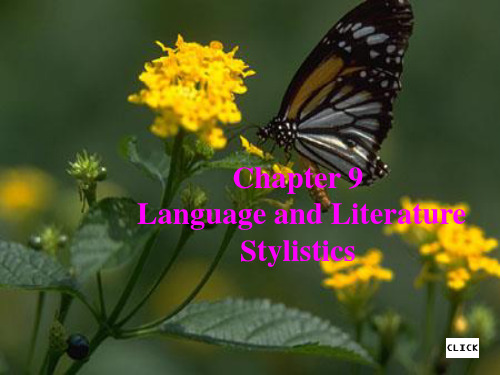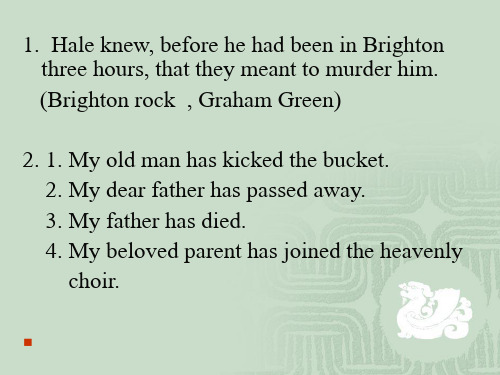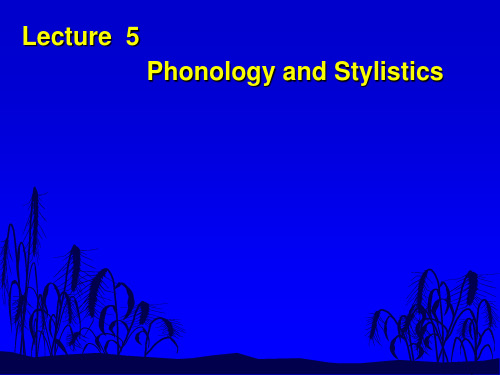语言学讲义 考研 9 Stylistics
- 格式:ppt
- 大小:4.68 MB
- 文档页数:120






Theme 主位and Rheme述位▪Theme is a clause-initial element. Theme is always that which comes first in the clause (in English).▪Theme provides the "local context" for the development of the clausal message. The rest of the message is called Rheme.▪Theme is the point of departure. What this means is that the Theme is the point beyond which the message in the clause properly takes off.The thematic portion can have as many as three elements:Textual Theme (structural)ConjunctionsConjunctive adjunctsWh-relatives [½ text., ½ top.]Interpersonal Theme VocativesModal adjunctsFinite elementsWh-question words [½ int., ½ top.] Topical Theme ParticipantCircumstanceProcessWhere Theme stops and Rheme starts. Here is the golden rule:In the clause, you start at the beginning and keep on searching until you find the Topical Theme. Once you've done that, you have your Thematic portion.Everything else after the topical Theme is the Rheme. The Thematic portion, therefore, is everything from the start of the clause up to and including the Topical Theme (unmarked).However, you'll need to make an exception where marked Themes are concerned.It is possible for the thematic portion to contain more than one topical Theme, provided all the topical Themes in the thematic portion are marked. More on this later.Let's start at the beginning of the clause. If you encounter any of the following: ▪Continuatives (eg, umm, yeah, ...)▪Conjunctions (eg, and, or, but)▪Conjunctive adjuncts (eg, however, therefore, because, ...)▪Wh-relative (eg, that, which, who, ...)label them as Textual Themes.As indicated in the table above, make a slight exception for wh-relatives. They are both textual and topical Theme rolled into one. Going by the golden rule, if you have a clause initiated by a wh-relative (which is both a textual and topical Theme), everything else after the wh-relative would be Rheme. For example:The official, « whoTxt/Top Theme slept on a meeting, »Rhemelost his job.If you encounter the following:▪Vocatives (eg, Henry!, Sir!, ...)▪Modal adjuncts, including mood and comment adjuncts (eg, probably, usually, frankly, ...)▪Finite operators (eg, modal auxiliaries, 'be' auxiliary, ...)▪Wh-question word (eg, who, what, where, how, why)label them as Interpersonal Themes.Again, make an exception for wh-question words. These are both interpersonal and topical Themes squeezed into one. Example:WhyInt/Top Theme did the official sleep? RhemeFinally, label the first participant (usually NG), circumstance (usually PP or AdvG), or process (VG) as Topical Theme. Once you've done that, you have your thematic portion of the clause. Here's a simple example with all three types of Themes:Well, Txt Sir,IntwhyInt/Topdo you sleep on my meeting?RhemePlease note that topical Themes are obligatory for all clauses. The other Theme types (textual and interpersonal) are optional. This means that, sometimes, you may even need to recover ellipsed elements in analysis. For example, in:Superman bit Mr Bean, and was sorry about it.We have two clauses, the topical Theme of the first clause is "Superman". The second clause’s topical Theme is ellipsed “he”:andTxt (Top) was sorry about it RhemeUnmarked非标记的& marked 标记的ThemesBy markedness is meant that the occurrence of some phenomenon is less typical or frequent. Hence, when we say that a Theme is marked, we are saying that it is less typical or frequent for it to be realised that way. And the opposite for unmarked Themes. And, whenever we talk about marked or unmarked Themes, we are referring only to the topical Theme, not the textual or interpersonal Theme.Let's now see what the unmarked Themes are like for different clausal moods:Declaratives:The unmarked Theme is the subject, as in: "Snow White picked her nose everyday." All other realisations of topical Themes are marked, for example: "Her nose, she loves to pick" (here, the complement, rather than the subject, is the topical Theme).Interrogatives:For interrogatives, we need to separate polar from content interrogatives:▪▪Content:The unmarked Theme is the wh-question word, as in: "Why did Snow White pick her nose?" All other realisations are marked. Imperatives:Like interrogatives, we also need to make a distinction between two types of imperatives -- inclusive and exclusive imperatives.▪Inclusive:The unmarked Theme is us, which is actually thewayward form of the subject (= we): pick our noses!" All other realisations are marked.▪Exclusive: The unmarked Theme is the process: "Pick your nose!" All other realisations are marked.Topical Themes realised by circumstantial elements are marked.Not all marked Themes, however, are the same. They differ in terms of the extent of markedness. Compare: which one is more marked?Noses, she loves to pick.In the evenings, she loves to pick noses.Multiple marked ThemesRemember the golden rule above? Now, consider the sentence below:Yesterday, with the computer, late into midnight, I prepared my presentation.If we go strictly by the golden rule, then only Yesterday would be analysed as the topical Theme. The rest of the clause, from with the computer onwards, would be the Rheme. But this doesn't seem quite correct. Some linguists, such as Martin (1995), have proposed a more intuitively appealing approach, by regarding all marked Themes in such instances as topical Themes. If so, the thematic portion in this sentence wouldn’t simply be Yesterday, but Yesterday, with the computer, late into midnight. Such an approach makes sense in terms of the broader characterization of Theme as the point of departure, since the additional marked Themes function to lay the ground and prepare for the message within the clause to properly take off. This is the only exception to the golden rule.One last thingTopical Themes are obligatory only for finite clauses and imperatives. NF clauses can be without topical Themes due entirely to their structural compactness. Look out, though, for the subject in NF clauses. If it's there, you have a topical Theme, but not otherwise. So in the first clause of "//after hearing how loudly//he sang//", we have only a textual Theme (after), but no topical Theme. On the other hand, the NF clause "his singing having hurt their eardrums ..." has a topical Theme (his singing).Given+New and Theme+RhemeThe information structure and the thematic structure are closely related. Normally, a speaker will locate the Given information in Theme and the climax of New information in Rheme. If not, we have a marked information structure.Unmarked:A: I slept on the meeting yesterday.B: You will be fired.Marked:A: Sleeping on a meeting will cause a dismissal.B: Then I will be fired.In the textIn looking at the thematic progression of the text, it is usual to look at the topical Themes of the main clauses only. [Why? That's because subordinate clauses are always dependent on the main clause and add little to the main idea(s) of structure the text.]How do the Themes of clauses progressed through the text? There are various patterns of thematic progression (TP). The first two are more common:Theme Iteration:I am a student.I attend school everyday.I like study.I prefer physics especially.Theme Development:Yesterday I went to the bookshop.I bought a novel.It is about WWII.Rheme Iteration:John respects Margaret.I also admire her enormously.Everyone, in fact, wants to emulate her.Rheme Regression:John got a full mark in exam.But Rose accused him of cheating.No one, fortunately, takes Rose seriously.Theme Iteration:I am a student.I attend school everyday.I like study.I prefer physics especially.Theme Development:Yesterday I went to the bookshop.I bought a novel.It is about WWII.Rheme Iteration:John respects Margaret.I also admire her enormously.Everyone, in fact, wants to emulate her. Rheme Regression:John got a full mark in exam.But Rose accused him of cheating.No one, fortunately, takes Rose seriously.Group work: Do a T-P analysis on the following text and improve its cohesion by revising Theme-Rheme organization:Should Private Schools be Encouraged in China?First of all, let’s have a clear picture of the general condition of China’s education. Now, China still has very low level of education. Compared with a large population of students, schools are very insufficient in China. Students can be provided with more chances to receive education by private schools. Secondly, the country’s heav y burden can be relieved by private schools. Different from public schools, private schools are supported by individuals. Therefore the country does not take the responsibility of giving the financial support to these private schools. Furthermore the taxes paid by the private schools can benefit the country. Money gained from these private schools can be put in developing our country’s education.Should Private Schools be Encouraged in China (original)First of all, let’s have a clear picture of the general condition of China’s education. Now, China still has very low level of education. Compared with a large population of students, schools are very insufficient in China. Students can be provided with more chances to receive education by private schools. Secondly, the country’s heav y burden can be relieved by private schools. Different from public schools, private schools are supported by individuals. Therefore the country does not take the responsibility of giving the financial support to these private schools. Furthermore the taxes paid by the private schools can benefit the country. Money gained from these private schools can be put in developing our country’s educ ation.Should Private Schools be Encouraged in China (revised)①First of all, let’s have a clear picture of the general condition of China’s education.②Now, China’ education level is still very low. Compared with a large population of students,③schools are very insufficient in China.④Private schools can provide students with more chances to receive education.⑤Secondly, private schools can relieve the country’s heave burden. Different from public schools,⑥private schools are supported by individuals.⑦Therefore the country does not take the responsibility of giving the financial support to these private schools.⑧Furthermore the country can benefit from the taxes paid by the private schools.⑨Money gained from these private schools can be put in developing our country’s education.①Yesterday I worked with my workmates in the school library.②We were writing down the number of magazines when another workmate came.③She brought drinks for us.④Later, we began to transfer the old-fashioned magazines to the warehouse.⑤It was really a hard project.⑥We kept doing it from 3PM to 5:30PM.⑦After completing the work, we all felt tired and hot.①In recent years, China has become increasingly active in the process of regional economic integration. ②While promoting globalization China is putting more emphasis on regional, economic cooperation. ③Lately, China and the Association of South East Asian Nations are actively pushing forward the building of a free trade area. ④This free trade area is to be established in 2010. ⑤The trade valume between China and ASEAN had reached 200 billion US dollars by 2007.白狐(歌词,词作者:玉镯儿)我是一只修行千年的狐千年修行,千年孤独夜深人静时可有人听见我在哭灯火阑珊处可有人看见我在跳舞我是一只等待千年的狐千年等待,千年孤独滚滚红尘里谁又种下了爱的蛊茫茫人海中谁又喝下了爱的毒我爱你时,你正一贫如洗、寒窗苦读离开你时,你正金榜题名、洞房花烛能不能为你再跳一支舞?我是你千百年前放生的白狐你看衣袂飘飘,衣袂飘飘海誓山盟都化作虚无能不能为你再跳一支舞?只为你临别时的那一次回顾你看衣袂飘飘,衣袂飘飘天长地久都化作虚无。